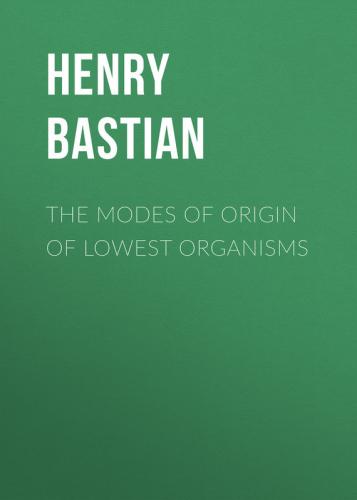what Professor Huxley has said, I believe it to be almost certain that in many cases
Bacteria exist in a solution in which there are neither
Torulæ nor developed fungi. And, on the other hand, I have seen fungi growing in a simple (boiled) solution of tartrate of ammonia, for weeks together, without the appearance of
Bacteria or the occurrence of any turbidity of the solution; and on two or three occasions I have seen
Torulæ swarming in an infusion without the presence of
Bacteria.
6
Rendiconti del R. Istit. Lombardo, Ser. II. Vol. 1, p. 11.
7
However novel such a mode of origin of independent Bacteria and Vibriones may appear to some, it will seem much less strange and unlikely to others who have seen, as I have done, an Amœba, or an Actinophrys-like body, originate from the progressive molecular modifications taking place in a mass of chlorophyll and protoplasm within the filament of an alga. Many independent observers have watched all the stages of this process, and some have even seen Ciliated Infusoria originate by such a metamorphic change.
8
Or offcasts from pre-existing fungi, – constituting the “micrococci” of Professor Hallier.
9
From this view the transition is also easy, though none the less illegitimate, to the doctrine that all fermentations are caused by organisms; just as it has been easy to start, and find converts for, the doctrine expressed by the phrase “omne vivum ex vivo.” The distinction between all and some is only too often overlooked.
10
‘Chimie organique,’ 1856, t. iv. p. 589.
11
Those who hold this opinion do not of course deny that living ferments can initiate fermentations. Every-day experience convinces them of the truth of this. They merely affirm that the intervention of vital action is not essential: they look upon fermentation as a purely chemical process, and believe that even in those cases where fermentation is initiated by living organisms (such as beer-yeast), these – although living – act chemically upon the matter which undergoes fermentation.
12
They may not believe this, because they may be unaware of the fact of the invariable association of some organisms with some kinds of fermentations, and may consequently have never concerned themselves with the evidence bearing upon this part of the question. (See Gerhardt, loc. cit.)
13
M. Pouchet and others had examined the dust which settles on objects, and amongst much débris of different kinds had found comparatively few ova or spores. He had not, however, up to this time, filtered the air, so as to see what germs might be detected floating about in the atmosphere.
14
‘Anat. et Physiol. compar.’ t. viii. p. 264.
15
‘Annales de Chimie et de Physique,’ 1862, t. lxiv. p. 24.
16
Those which he believed to be eggs of ciliated infusoria, may be at once dismissed from consideration, as we are not at present concerned with the origin of organisms of this kind.
17
Loc. cit. p. 34, note 1.
20
M. Pasteur’s use of this term, in which he is followed by others holding similar opinions, is much to be deprecated. Having said that he had found certain corpuscles which resembled spores of fungi, or ova of infusoria, he subsequently speaks of them as “germs,” and also applies the same name to the reproductive particles of Bacteria, which he merely assumes to be present in the atmosphere. Thus, having only proved that corpuscles resembling spores of some fungi, are to be found in the atmosphere, he subsequently speaks of the presence of a multitude of atmospheric germs as an established fact, without at all prominently pointing out that, so far as the most important of these are concerned – germs of Bacteria– their existence had only been inferred, and not proved.
